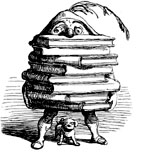
Tolle Lege: The Wisdom of the Great Books
HOW ARE YOU USING YOUR QUARANTINE TIME?
Time is a valuable thing, and during this time of pandemic we’ve been graced with time — time, as St. Augustine said, to pick up and read. And not to read just anything, but to read the great books. Why should we take the time to read the great books? “We read to find ourselves,” the late Harold Bloom wrote. I would go deeper: We read to save ourselves.
St. Augustine famously asked the perennial question: Mihi quaestio factus sum — What am I? Throughout the Confessions, Augustine’s pilgrimage to God is not just a theological pilgrimage to truth but an inward journey to discover himself. In discovering himself, he also discovers God. To know himself is to know His Creator and, by Christian standards, bring about his salvation. Finding ourselves is intertwined with our salvation. And the wisdom of the great books tells us what is at the heart of self-discovery and salvation.
+++
Homer’s Iliad, that seminal classic of literature, is more than just an epic of war; it is also a grand epic of love. The cosmos of the Greeks was permeated by darkness, grotesque violence, and sexual lust. Hesiod’s Theogony recounts the older, more sublime, and violent cosmos in which the Greeks lived. After all, the gods in Hesiod’s strife-filled poem are born out of lust, usurpation, and war. Violence is very much part of Homer’s world too, but deep within this bleak cosmos a glimmer of light appears.
Each of the individual characters in The Iliad embodies a world in tension and transformation in Homer’s time. Agamemnon, Diomedes, and, initially, Achilles all embody the pathological violence common to the Hesiodic cosmos. Individuals like Helen, Briseis, and Hector are caught between the old world of uncontrollable violence and the new world of love and directed desires. Briseis, as she tells us, loved Achilles, and Achilles loved her. She calmed the rage-filled killer, and her seizure by Agamemnon sparks the conflict between Achilles and the “lord and controller of men.” Hector, more than any of the other Homeric heroes, is devoted to father, fatherland, and family; everything he does he does out of love for Priam, Troy and the gods, and his wife and infant son.
You May Also Enjoy
At times Christian writers have entered that exclusive realm where profound insight into the wisdom of Christianity joins artistic merit to produce fiction of a higher order.
Literature offers many examples highlighting the fact that, in very subtle ways, men can be victimized -- even “tortured” -- by the fair sex.
The citizens of Oceania are not only stripped of human freedom and basic rights but so dehumanized that each individual lacks any semblance of human dignity.

